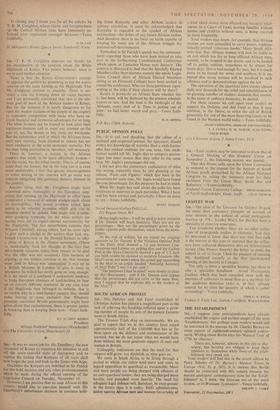SIR, - -T. R. M. Creighton deserves our thanks for his examination
of the position about the White Highlands of Kenya. Two points, however, seem to me to need further attention.
There is first the Kenya Government's attempt to appease the settlers by promising to put the native reserves on the same footing as the Highlands. This Mr, Creighton omitted to examine. There is cer- tainly a case for bringing -down all racial barriers, and I am personally convinced that that is the ulti- mate goal of most of the African leaders in Kenya. But for the moment it is surely dangerous to lay open the weaker sections of the people of the country to economic competition with those who have en- joyed financial and economic advantages for so long. The white farmers can be trusted to look after their legitimate interests and to resist any attempt on the part of, say, the Asians to buy them out wholesale. But the subsistence level at which thc Africans have, until very recently, been allowed to remain has not been conducive to the same economic maturity. For the time being protection is. therefore, still necessary.
There is, however, a barrier in the African reserves that needs to he more effectively broken— not the racial, but the tribal barrier. This is, of course, laxer than the former. but in the long run it is even more undesirable. I feel that greater encouragement to tribal mixing in the reserves will go sonic way towards mitigating this potential divisive element in the country.
Another thing that Mr. Creighton might have examined more thoroughly is the. European com- plaint that opening up the Highlands to other races constituted a betrayal of solemn pledges made about its • inviolability. The moral problem raised here seems to he whether promises whiCh give rise to injustice should he upheld. One might feel a some- what grudging sympathy for the white settlers for having been led to expect eternal sacrosanctity for the Highlands. The fact nevertheless remains that Winston. Churchill, among others, had no more right to give such a pledge to the settlers than had, say, JoSeph Chamberlain or Sir Donald Stewart to offer a piece, of Kenya to the Zionist movement. (There is, incidentally, food for thought in the fact that Afro-Jewish relations today have reason to be glad that the offer was not accepted.) This business of arguing, as the settlers continue to do, that because some land in Africa! was 'unoccupied' it was up to a British Minister in London to give it away to whomever he willed has surely gone on long enough. It is the result of a confused if convenient tendency to hririg European concepts of land-holding to bear on an entirely different continent.'In any case, 'even if the Highlands then belonged to nobody, that is no reason why in a land-hungry country they should today ;belong to' some exclusive few. Whatever promises successive British governments might have given about that exclusiveness, there is greater justice in breaking than in keeping them now.—Yours faith- fully, ALI AI 'AMIN MAZRUI President African Students' Association (Manchester) c/o The University Union, Manchester, 13






































































 Previous page
Previous page